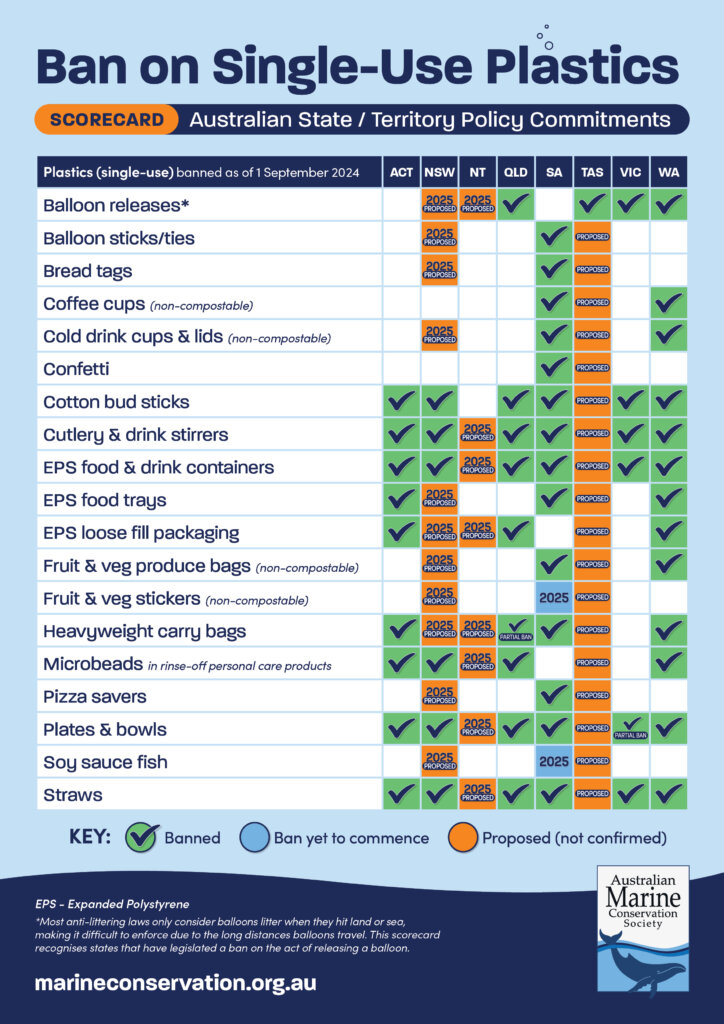Thanks to incredible momentum inspired by ocean lovers, all Australian states and territories have now committed to ban certain single-use plastics.
Yet with each jurisdiction committing to ban different plastics, you might be wondering which state is leading the race to ban single-use plastics in Australia.
See which plastics each state has committed to ban, by when, in the report card below.
More information
The Australian Capital Territory Government’s first ban on single-use plastic items commenced on 1 July 2022. Single-use plastic cutlery, drink stirrers,, straws, cotton bud sticks, plates, bowls, heavyweight carry bags, expanded polystyrene food and beverage containers, expanded polystyrene loose fill packaging, expanded polystyrene trays and plastic microbeads in rinse-off personal care products have now all been banned in the ACT. Details here.
The New South Wales Government’s first ban on single-use plastics commenced on 1 November 2022. NSW has banned single-use plastic straws, stirrers, cutlery, plates, bowls, cotton bud sticks, expanded polystyrene food service items, and microbeads in cosmetics. NSW is proposing to ban more problematic plastics from 2025. Details here.
The Northern Territory Government has committed to ban some single-use plastics by 2025 under the NT Circular Economy Strategy. Under the strategy, NT proposes to ban single-use plastic bags, straws, stirrers, cutlery, bowls, plates, microbeads in personal health care products, expanded polystyrene consumer goods packaging (loose fill and moulded), balloon releases and heavyweight plastic carry bags. Details here.
The Queensland Government’s first ban on single-use plastics commenced on 1 September 2021. Single-use plastic straws, drink stirrers, cutlery, plates, bowls, cotton bud sticks, balloon releases, microbeads in rinse-off personal care products and expanded polystyrene food & beverage containers are now banned in Queensland. Queensland has also introduced requirements on the durability of heavyweight plastic bags. .. Details here.
South Australia’s first ban on single-use plastics commenced on 1 March 2021. Single-use plastic straws, drink stirrers, cutlery, bread tags, non-compostable plastic cups, confetti cotton bud sticks, produce bags, pizza savers, plates, bowls, expanded polystyrene food and drink containers and heavyweight carry bags have now all been banned in SA. Fruit and vegetable stickers and soy sauce fish will be banned from 2025. Details here.
The Victorian Government’s single-use plastics ban commenced on 1 February 2023, banning single-use plastic straws, cutlery, plates, drink stirrers, plastic cotton bud sticks, and expanded polystyrene food and drink containers. The ban includes conventional, degradable, and compostable plastic versions of these items. Details here.
The Western Australian Government’s first ban on single-use plastic items commenced in 2022. Single-use plastic cotton bud sticks, cutlery, drink stirrers, produce bags, straws, non-compostable cups, expanded polystyrene food and drink containers, microbeads in rinse-off personal care products and balloon releases are all banned in the state.
Tasmania has proposed to ban single-use plastic items that have been banned in at least one other Australian state or territory. Tasmania’s bans are subject to public consultation, and will be introduced across two stages. Details here.
National commitments
At a meeting of federal, state and territory environment ministers in October 2022, Environment Ministers agreed to reform packaging in Australia. The reform will introduce new laws to make businesses responsible for the packaging they place on the Australian market. The laws will include design standards and ban harmful chemicals from being used in packaging. The Federal Government is expected to consult on the proposed laws in 2024. Details here.
